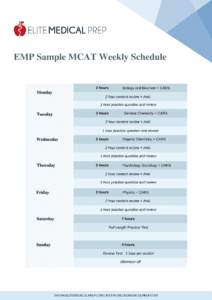How to Customize an MCAT Study Schedule

4489 Views
An MCAT study schedule is the key to your success on the MCAT exam. If you are an aspiring medical student, then you know the importance of the daunting Medical College Admissions Test (MCAT). The MCAT is an important part of your medical school application and allows medical admissions committees to interpret your academic data when comparing you to students from other institutions. It is therefore of the utmost importance that you do well on this important exam, beginning with an MCAT study schedule and incorporating a few great MCAT study resources.
Regardless of whether you are studying for the MCAT during the academic year or you are taking a month off in the summer to focus on your MCAT study plan, you can do well as long as you have designed the best study schedule for yourself. Below are steps to follow to generate an effective MCAT study schedule.
Choose Your MCAT Test Date
As you set your MCAT study schedule, the first thing you want to do is select a tentative test date. This will give you an idea of how many months you have to prepare. Before selecting a test day consider the following questions:
Have you taken all the prerequisite courses needed to do well on the MCAT? These courses include general chemistry, organic chemistry, physics, biology, biochemistry and psychology. It is recommended that you take the MCAT after you have completed at least one semester of all of these courses, as the things you learn in these courses will be critical as you study for the MCAT.
When are you applying to medical school? The MCAT should be taken before you apply to medical school. To give yourself the best chance in the application cycle the absolute latest you should take the MCAT is May of your application year. However, taking it earlier is recommended because it will give you the opportunity to retake it if needed. In addition, if you plan to take one or more gap years, try to take the MCAT as soon after you finish taking the prerequisite courses because your MCAT studies will be easier as you’ll recall information you learned more recently.
In addition, consider other commitments you have during your MCAT study period. If you have numerous extracurriculars, a heavy class load or a busy work schedule, you may want to give yourself more time to study and choose a later test date. It is important to not get burnt out during your MCAT study schedule, so if you are able to take a lighter class load or a semester off from extracurriculars this is strongly recommended.
Identify How Much Time You Realistically Can Dedicate to Your MCAT Study Schedule Each Week
Now that you know how many months you have to prepare, it’s time to decide how many hours a week you can dedicate to MCAT study prep in your schedule.
The average student should spend a total of at least 250-300 hours in MCAT studies. For example, if you have 12 weeks (3 months) to study for your exam you should make sure you have ~20-25 hours/week for your MCAT study schedule in order to feel the most prepared.
Therefore, based on your test date and how many hours you’ll need in your MCAT study plan a week, you should be able to come up with a realistic number of hours to study each day. For example, if you need to study 20-25 hours per week you should plan to study ~ 2-3 hours a day on weekdays and 5-7 hours a day on weekends for the MCAT. In addition, it’s important to occasionally take a full day off either on Saturday or Sunday to avoid burnout, so make sure to incorporate this into your weekly plan as well.
Familiarize Yourself With the MCATFormat and Identify Your Weaknesses
Most likely, the structure and scoring of the MCAT is different from any other exam you’ve taken. Therefore, it’s important to familiarize yourself with the structure of the MCAT. This will help you structure your MCAT study schedule, and decide on which MCAT resources you should focus on.
The MCAT is a 7.5-hour exam that consists of four sections. The sections are: Biological and Biochemical Foundations of Living Systems; Chemical and Physical Foundations of Biological Systems; Psychological, Social, and Biological Foundations of Behavior; and Critical Analysis and Reasoning Skills (CARS).
All the sections except for CARS are 59 multiple choice questions that you have 95 minutes to answer. The CARS section is 53 multiple choice questions that you have 90 minutes to answer. You will have two 10-minute breaks and one 30-minute break during the duration of the exam.
The other thing to familiarize yourself with during your MCAT study plan is your own strengths and weaknesses. A practice test can be a useful place to start. This will acquaint you with the exam layout, the way the questions are written and help you identify your weaker areas.
When you take a practice test you might notice there is a topic or section that feels more difficult than the others. This is important to identify early so you can incorporate this into your MCAT study schedule going forward.
Building Your MCAT Study Schedule and Prioritizing MCAT Resources
Now you are ready to build an MCAT study schedule! There are two aspects of a great MCAT study schedule: content and method. Content involves deciding what topic you will review each day and the method is deciding what resources you will use to study.
When building your MCAT study schedule, first, decide which topic you want to focus on each day during a given week. You can make a template that reflects which MCAT section you want to focus on each day and then break it down by the chapters in those topics.
In your MCAT study plan, begin with weaker topics so that you can review them a second time towards the end of your study period if needed. Each day, pick at least 1-2 topics to review in-depth. While you are reviewing your preferred study resources (popular resources include Khan Academy and ExamKrackers) create MCAT Anki flashcards. The purpose of these flashcards is so you can continue reviewing content you’ve learned through your MCAT study resources as you move on to new material throughout your study period. Depending on your schedule, dedicate at least 2 hours to content review a day. This will include reviewing content and making and reviewing Anki flashcards.
Once you’ve reviewed MCAT study material for the day, do practice questions! Doing practice questions every day is the most important way to study for the MCAT and the way you’ll see an increase in your score the fastest. UWorld is a very popular resource for practice questions. Try to do at least 30-45 minutes of practice questions in test mode a day and spend at least 30-45 minutes reviewing the questions you missed, focusing on why you missed them. Read the explanation thoroughly and make Anki cards for any concepts or new information you learned while reviewing the question.
Taking full-length practice exams is also important. The MCAT will most likely be the longest test you’ve taken in your career thus far, so building stamina for the examination is crucial. The AAMC has 4 full-length practice tests that mimic the real MCAT. Other resources such as UWorld also offer full-length tests. Depending on how much time you have, try to take at least 4-6 full-length practice tests during your MCAT study period. For example, during a 12 week study period, you may want to take a practice exam on week 1, week 4, week 7, week 9, week 11, and week 12.
Building stamina for the examination is crucial. The AAMC has 4 full-length practice tests that mimic the real MCAT. Other resources such as UWorld also offer full-length tests. Depending on how much time you have, try to take at least 4-6 full-length practice tests during your study period. For example, during a 12 week study period, you may want to take a practice exam on week 1, week 4, week 7, week 9, week 11, and week 12.
Sample MCAT Study Schedule:
Detailed Sample 1-week Schedule:
People also Ask:
How many hours a day should I study for the MCAT?
It will vary depending on your test taking abilities, but studying at least 25 hours a week is a good ballpark figure: do 2-3 hours of MCAT study prep per weekday and 5-7 hours per day on the weekend.
Is 5 months enough time to study for the MCAT? Is 4 months enough?
It will depend on the person, but 5 months is a good recommendation if you follow your MCAT study schedule strictly. Remember that this will possibly be the hardest test you’ve ever taken, so don’t cut corners.
Is 6 months too long to study for the MCAT?
While we don’t want to put a number on how long is TOO long, it is important that you take the MCAT within a relatively close amount of time to when you finished your courses, so that the information is still fresh in your memory. Obviously, a good MCAT study schedule will help to keep the information stuck in your mind, but you don’t want to stretch it out interminably.
What Other MCAT Study Prep Resources Are Available?
We offer 1 on 1 tutoring for your MCAT studying. You will be given a tutor who will help you to find and set an MCAT study schedule, and then work with you continually throughout your studies as a partner to help you get through the process, take the test, and move on to medical school.
Featured Articles


